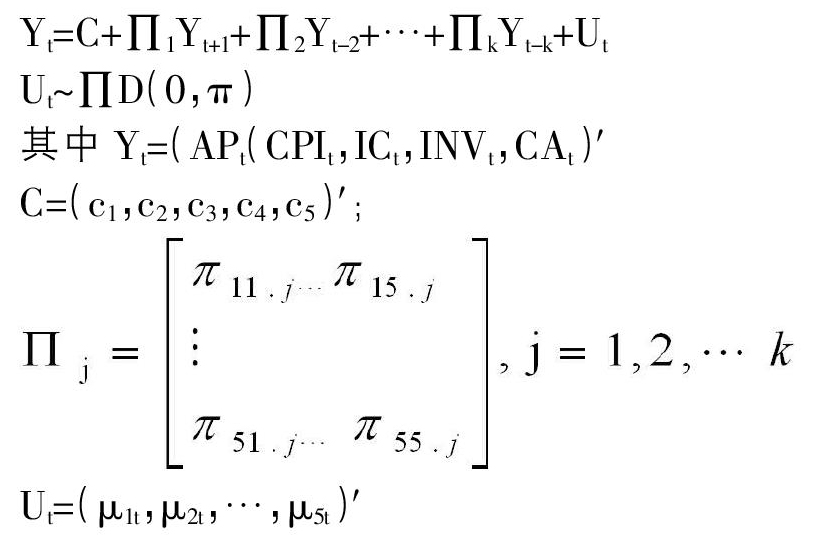肖文



摘要:针对商品房价格的影响因素,以合肥市房价为研究对象,根据价格理论,构造了商品房均衡价格模型,并从供需两侧选取了INV、CPI、LC、以及CA四个变量进行实证分析。首先,运用1997年-2016年合肥市各变量年度数据,通过Spearman相关系数检验,得出所选取的变量与商品房平均销售价格之间均具有较强的相关关系。其次,利用合肥市2013年4月-2017年11月部分变量的月度数据,建立向量自回归模型,利用脉冲响应分析和方差分解来进一步分析合肥市CPI、INV、CA以及LC几个变量对合肥市商品房平均销售价格的影響,最终得出除了房价自身以外,INV与CPI对房价的波动都做出了贡献,而LC与CA的贡献度很小。最后,根据实证分析的结果提出相关政策建议。
Abstract: According to the factors affecting the price of commodity house, the house price of Hefei City is taken as the research object. According to the price theory, the equilibrium price model of commodity house is constructed. The four variables of INV, CPI, LC and CA are selected from both sides of supply and demand for empirical analysis. Firstly, using the annual data of various variables in Hefei from 1997 to 2016, through the Spearman correlation coefficient test, it is concluded that there is a strong correlation between the selected variables and the average selling price of commodity house. Secondly, using the monthly data of partial variables from April 2013 to November 2017 in Hefei City, a vector autoregressive model was established, and the pulse response analysis and variance decomposition were used to further analyze the CPI, INV, CA and LC variables of Hefei City. The impact of the average selling price of commercial housing in the city finally concluded that INV and CPI contributed to the fluctuation of housing prices in addition to the housing price itself, while the contribution of LC and CA was small. Finally, based on the results of the empirical analysis, the relevant policy recommendations are proposed.
关键词: 商品房价格影响因素;Spearman相关系数;VAR模型;脉冲响应分析;方差分解
Key words: factors influencing commodity house price;Spearman correlation coefficient;VAR model;pulse response analysis;variance decomposition
中图分类号:F293.35 ? ? ? ? ? ? ? ? ? ? ? ? ? ? ? ? ? 文献标识码:A ? ? ? ? ? ? ? ? ? ? ? ? ? ? ? ? ?文章编号:1006-4311(2019)07-0033-04
0 ?引言
众所周知,在世界大部分国家和地区,房地产行业都占有举足轻重的地位,是各国国民经济的支柱产业,可以说,房地产行业的兴衰直接关乎着国民经济是否能够稳定运行。我国的房地产行业也不例外,每年房地产行业都能为我国GDP做出稳定贡献,不仅如此,房地产行业的特殊性使得其间接带动了其他相关领域的发展,可以说,房地产行业已经正式成为我国国民经济的支柱产业。但是,随着房地产行业的飞速发展,也引发了一系列的问题。其中,最主要的就是过度投资以及房价居高不下。为了抑制房价过高增长,我国政府多次进行了宏观调控,出台了一系列政策,确实也在一定程度上稳定了房价,但由于中国是个人口大国,而且低收入群体占比很大,现前的房价对大部分老百姓而言依旧是个可望不可即的数字。尤其是在一些大中型城市,房价上涨速度愈发加快,根据有关资料显示,在1997年合肥市的商品房平均销售价格还只有987(元/平方米),然而,到了2016年,这一数字已经变成了9369(元/平方米),涨幅接近10倍之多。2016年3月份合肥市的新房环比涨幅达到4.6%,在全国名列第二,仅次于厦门,二手房环比涨幅高达 9.3%,成为全国领跑者。合肥与厦门、南京、苏州并称为“四小龙”,受到前所未有的关注度,可以说已成为房地产中的“网红”代表。尤其在近两年,合肥市房价甚至出现了“爆炸式”上涨,部分地区房价达到了惊人的20000(元/平方米),高房价给大批年轻人尤其是外来人口带来了巨大的生活压力。为此,合肥市政府也出台了一系列政策措施来印制房价的飞速上涨,如限购政策、限贷政策、最新落户政策以及调整银行贷款利率等。房价背后的影响因素错综复杂,本文主要对相关影响因素进行实证分析,为政府以及居民消费者提供一些参考性意见。
- 忠言无须逆耳
- 初中学校管理模式及优化设想阐释
- 关于E时代下初中班主任工作的几点思考
- 用STEAM理念践行培养学生的核心素养
- 试论初中物理教学中如何培养学生的实验探究素养
- 以兴趣做先导让课堂充满活力
- 学生基本能力培养在初中英语教学中的思考
- 初中数学高效课堂构建路径探究
- 浅谈初中英语教学中如何减轻学生课业负担
- 通过作业设计培养学生物理核心素养的实践研究
- 初中“三元色”课程的构建与实施
- 初中体育教学提升学生主动参与度的策略探讨
- 初中体育教学中培养学生核心素养的实践研究
- 初中体育教学中如何提升学生主动参与性
- 美术课程创新素质的培养
- 初中化学教学中培养学生质疑能力的思考
- 通过实验活动提高农村初中生学习兴趣的策略研究
- 如何提高学生学习化学的兴趣
- 如何在初中生物实验教学中培养学生的核心素养
- 通过物理实验有效探究,提高学生自主分析能力
- 如何提高初中生的数学解题能力
- 从“知”到“智”
- 关于初中数学教学课程中学生反思能力培养的研究
- 提升初中生数学运算能力的探究
- 数学新课程教学中学生思维的激发与引导①
- zero-rate
- zerorated
- zero-rated
- zero rating
- zeros
- zero-sum game
- zerosumgame
- zero tolerance
- zero tolerances
- zero²
- zero¹
- zest
- zested
- zestful
- zestfully
- zestfulness
- zestfulnesses
- zesting
- zestless
- zests
- zesty
- '-zia
- zig-zag
- zigzag
- zigzagged
- 寝馈难安
- 寝麻菜
- 寝默
- 寞
- 寞寂
- 寞寞落落
- 察
- 察三访四
- 察举
- 察伺
- 察允
- 察入
- 察判
- 察勘
- 察合台
- 察合台汗国
- 察听
- 察哈尔省
- 察子
- 察官
- 察宥
- 察察
- 察察为明
- 察察为智
- 察察而明